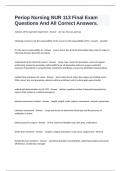Periop Nursing NUR 113 Final Exam
Questions And All Correct Answers.
3 phases of the operative experience - Answer pre-op, intra-op, post-op
obtaining consent is not the responsibility of the nurse it is the responsibility of the - Answer provider
it is the nurses responsibility to - Answer ensure the pt has all of the information they need, to make an
informed decision about the procedure
components of an informed consent - Answer name, type, reason for procedure, name of surgeon
performing, reason the procedure will benefit the pt, all alternative option to surgery, potential
outcomes if procedure is not performed, consent for anesthesia, consent to administer blood products
medical time-out/pause for cause - Answer starts when the pt enters the surgery area stating name,
DOB, correct site, and procedure, patient confirms wristband, and it is done again upon transfer
patient self determination act of 1991 - Answer defines a patients wishes if deemed incompetent to
express their wishes in a medical emergency
physical assessment includes - Answer height, weight, vitals, systems assessment, and pain assessment
Labratory assessment - Answer a type and screen to determine blood type and the presence of
antibodies is drawn
physical prep for surgery - Answer IV line, bowel and bladder prep, skin prep, medications
sterile team members - Answer surgeon, surgical assisstants, scrub nurse, surgical tech , OR tech
Nonsterile team members - Answer anesthesia provider, circulating RN, unlicensed assistive personnel,
OR director, coordinator, manager
,the pre-op assessment includes - Answer patients knowledge of surgery, complications, and
interventions
Goals of anesthesia - Answer amnesia, analgesia, depression of reflexes, muscle relaxation,
manipulation of physiological systems/functions
Four types of anesthesia: - Answer 1. General
2. Regional
3. local
4. monitored or conscious sedation
airway compromise can be caused by relaxation of the - Answer soft tissues of the oropharynx
Airway Complications include: - Answer laryngospasm, bronchial intubation, tracheal and esophageal
perforation, aspiration
4 standard positions for surgical procedures - Answer supine/dorsal recumbent, prone, lateral,
lithotomy
4 high risk situations - Answer -long surgery
-vascular surgery
-demineralizing bone conditions
-excessive sustained pressure on body
phase 1 and 2 of post anesthesia care unit(PACU) - Answer involves the nursing care provided in the
immediate post anesthesia period
phase 3 of post anesthesia care unit(PACU) - Answer extended observation of PA care, focuses on
providing ongoing care for those patients remaining in the post op care area after discharge criteria have
been met
, 1. The nurse is completing the preoperative checklist on the night shift in preparation for the patient's
surgery, scheduled for 0800. Which tasks could the nurse complete at this time?
1. Documenting the time of last voiding
2. Checking the medical record for the history, physical, and signed informed consent
3. Administering preoperative medication
4. Removing the prosthesis - Answer 2
2. Which action is the priority when providing care to a patient in the preoperative period?
1. Admitting the patient to the facility
2. Educating the patient on the surgical process
3. Ensuring the patient's preoperative checklist is complete
4. Answering all questions for the patient about surgery - Answer 3
3. What is the priority nursing action when providing patient care during the preoperative phase of
care?
1. Ensuring NPO status
2. Monitoring vital signs
3. Obtaining informed consent
4. Completing a preoperative checklist - Answer 4
4. The nurse is reviewing the medical records for patients who are scheduled for surgery the next day.
Which patient may not provide consent to receive blood products?
1. A Hispanic Catholic patient
2. An African-American Baptist patient
3. A Caucasian Jehovah's Witness patient
4. A Native American patient with no religious affiliation - Answer 3
5. The nurse provides care to a patient who is having surgery later in the day. The patient has





